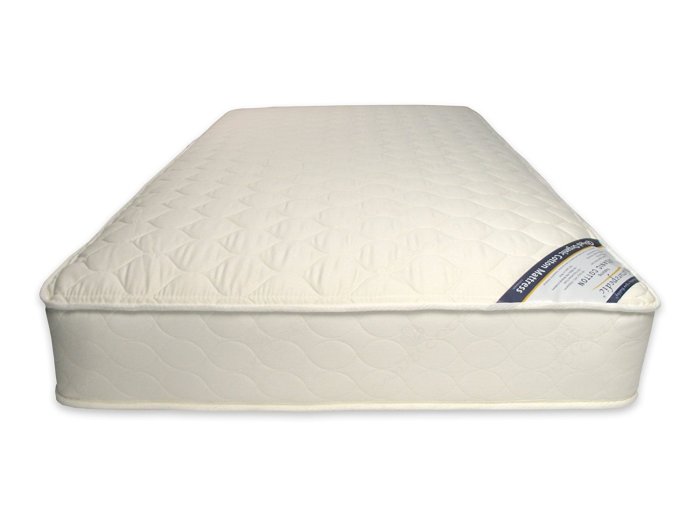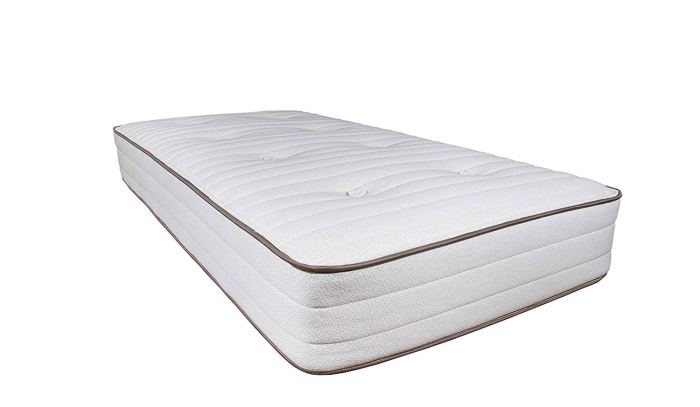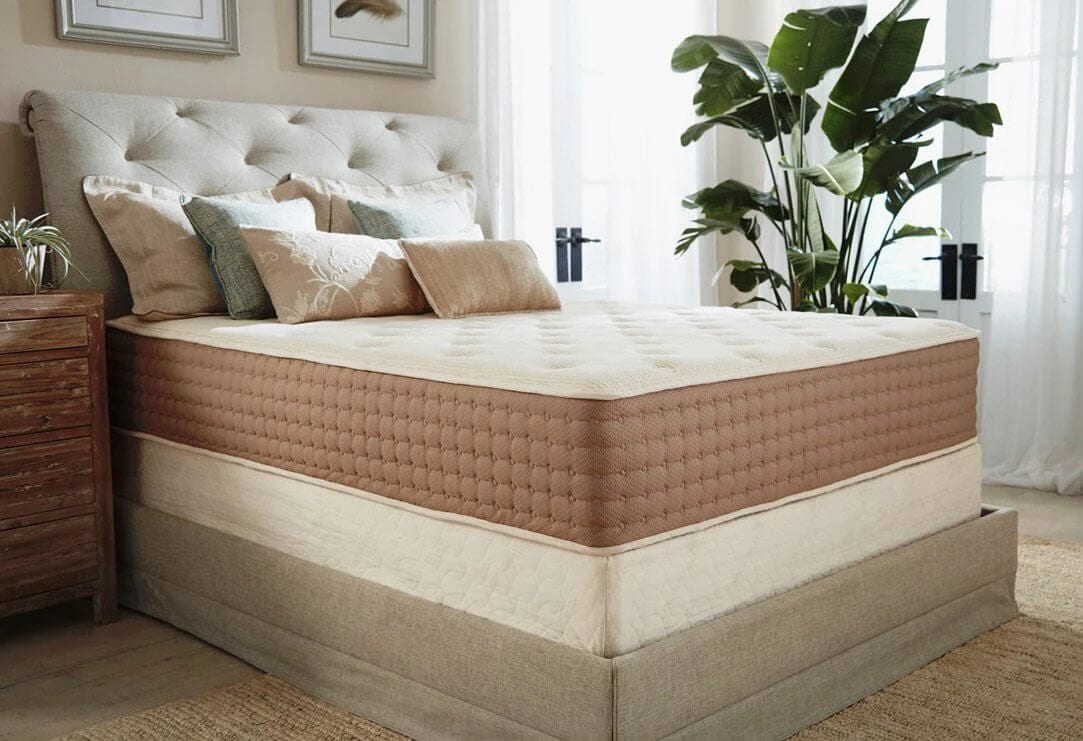In today’s world, Organic Non Toxic Mattress are gaining prominence as health-conscious individuals seek to enhance their sleep quality and overall well-being. These mattresses are meticulously crafted using organic materials and non-toxic components, offering a myriad of benefits that promote a restful and rejuvenating sleep experience.
Organic Non Toxic Mattress are designed to provide a healthier sleep environment, free from harmful chemicals and synthetic materials that can disrupt sleep and pose potential health risks. By embracing organic and non-toxic components, these mattresses contribute to a more sustainable and eco-friendly lifestyle.
Organic Materials and Certifications: Organic Non Toxic Mattress
Non-toxic mattresses prioritize the use of organic materials to ensure a safe and healthy sleep environment. These materials include:
- Organic cotton: Grown without pesticides or synthetic fertilizers, providing a soft and breathable surface.
- Natural latex: Derived from rubber trees, offering exceptional support and pressure relief.
- Organic wool: Regulates temperature and wicks away moisture, creating a comfortable sleeping experience.
- Coconut fiber: Provides firmness and durability, contributing to a supportive sleep surface.
- Organic buckwheat hulls: Naturally hypoallergenic and breathable, offering conforming support.
Certifications
Certifications play a crucial role in verifying the organic integrity of non-toxic mattresses. Prominent certifications include:
- GOTS (Global Organic Textile Standard): Ensures organic production throughout the supply chain, from raw materials to finished products.
- GOLS (Global Organic Latex Standard): Certifies organic latex production, ensuring the use of natural and sustainable materials.
- OEKO-TEX Standard 100: Tests for harmful substances in textiles, ensuring the absence of potentially hazardous chemicals.
These certifications provide assurance that organic materials have been grown and processed without the use of harmful chemicals, promoting a safe and healthy sleep environment.
Benefits of Organic Materials
Using organic materials in non-toxic mattresses offers numerous benefits:
- Improved sleep quality: Organic materials create a comfortable and supportive sleep surface, promoting restful and rejuvenating sleep.
- Reduced exposure to chemicals: By eliminating synthetic materials and harmful chemicals, non-toxic mattresses minimize potential health risks associated with conventional mattresses.
- Hypoallergenic and breathable: Organic materials are naturally hypoallergenic and breathable, reducing the risk of allergies and skin irritation.
- Environmental sustainability: Organic farming practices promote biodiversity and reduce environmental pollution, contributing to a healthier planet.
Investing in a non-toxic mattress made with organic materials is an investment in your health, well-being, and the environment.
Non-Toxic Components

Organic mattresses prioritize the use of non-toxic components to create a healthier sleep environment. These materials are free from harmful chemicals, synthetic materials, and allergens, ensuring a safer and more comfortable night’s rest.
Common non-toxic components found in organic mattresses include:
- Natural Latex:Derived from rubber trees, natural latex provides excellent support and pressure relief without the use of synthetic materials. It is hypoallergenic, resistant to dust mites, and offers a durable and breathable sleeping surface.
- Organic Cotton:Grown without pesticides or synthetic fertilizers, organic cotton is soft, breathable, and wicks away moisture. It creates a comfortable and hypoallergenic sleep surface.
- Organic Wool:Obtained from sheep raised without the use of pesticides or herbicides, organic wool is naturally flame-resistant, wicks away moisture, and regulates temperature.
- Plant-Based Foams:Derived from renewable plant sources such as soybeans or corn, plant-based foams offer support and cushioning while being free from toxic chemicals.
Potential Health Risks of Toxic Materials
Conventional mattresses often contain toxic materials that can have adverse health effects. These materials include:
- Polyurethane Foam:This synthetic foam emits volatile organic compounds (VOCs) that can cause respiratory problems, headaches, and nausea.
- Memory Foam:Memory foam also releases VOCs and can contain flame retardants that have been linked to cancer and reproductive problems.
- Fire Retardants:Synthetic fire retardants used in conventional mattresses can release harmful chemicals that can irritate the skin, eyes, and respiratory system.
By choosing an organic mattress with non-toxic components, you can create a healthier sleep environment that supports your well-being.
Construction and Design

Organic non-toxic mattresses employ various construction methods, each offering unique advantages and considerations. Understanding these methods helps you choose the mattress that best meets your sleep needs and preferences.
Two primary construction methods dominate the organic non-toxic mattress market: innerspring and foam.
Innerspring
- Innerspring mattresses feature a core of interconnected steel coils that provide support and bounce.
- Advantages:
- Excellent breathability, preventing heat retention.
- Responsive and bouncy, offering a traditional mattress feel.
- Available in various firmness levels to suit different sleep preferences.
- Disadvantages:
- Can be noisy due to coil movement.
- May not conform as well to body contours as foam mattresses.
Foam
- Foam mattresses consist of layers of polyurethane foam, memory foam, or latex foam.
- Advantages:
- Excellent pressure relief, conforming to body contours for optimal support.
- Quiet and motion-isolating, minimizing partner disturbance.
- Available in a wide range of firmness options and feels.
- Disadvantages:
- Can retain heat more than innerspring mattresses.
- May not offer the same level of bounce as innerspring mattresses.
Ultimately, the best construction method for you depends on your individual sleep preferences, body type, and budget. Consider these factors when making your decision.
Proper support and comfort are essential for a restful sleep. A mattress that provides adequate support helps maintain spinal alignment, reducing pressure points and muscle strain. Comfort, on the other hand, ensures you feel cozy and relaxed, allowing you to fall asleep and stay asleep throughout the night.
Durability and Maintenance
Organic non-toxic mattresses are designed to provide long-lasting comfort and support. They are made with high-quality materials that are durable and resistant to wear and tear. With proper care and maintenance, an organic mattress can last for many years.
To extend the life of your organic mattress, it is important to follow the manufacturer’s care instructions. These instructions will typically include recommendations for cleaning, rotating, and airing out the mattress. It is also important to avoid exposing the mattress to direct sunlight or moisture.
Disposal
When it comes time to dispose of your organic mattress, there are a few options available. You can donate it to a local charity or recycling center. You can also compost it if it is made with biodegradable materials. However, it is important to check with your local composting facility to see if they accept mattresses.
If you’re in the market for a new mattress, you may be wondering if an IKEA baby mattress is right for you. IKEA mattresses are known for their affordability and comfort, but they may not be the best choice for everyone.
Before you make a decision, it’s important to do your research and read Aldi mattress reviews to see what other consumers have to say.
Comparison and Market Trends

The organic and non-toxic mattress industry is rapidly evolving, with new brands and innovations emerging regularly. To help you make an informed decision, here’s a comparative table of different organic non-toxic mattress brands:
| Brand | Materials | Certifications | Price Range |
|---|---|---|---|
| Avocado Green Mattress | Organic cotton, wool, latex | GOTS, GOLS, OEKO-TEX | $1,299
|
| Saatva Organic Mattress | Organic cotton, wool, latex, coils | GOTS, GOLS, OEKO-TEX | $1,599
When searching for the perfect baby mattress, many parents turn to trusted brands like IKEA. Their IKEA baby mattress is known for its comfort and safety, making it a popular choice for newborns and toddlers alike. For those seeking a budget-friendly option, the Aldi mattress review is worth considering. Aldi’s mattresses offer a combination of affordability and quality, providing a comfortable sleep surface for little ones.
|
| Helix Organic Mattress | Organic cotton, wool, latex, coils | GOLS, OEKO-TEX | $1,399
|
| Nest Bedding Organic Mattress | Organic cotton, wool, latex | GOTS, GOLS, OEKO-TEX | $1,199
|
| Naturepedic Organic Mattress | Organic cotton, wool, latex, coils | GOTS, GOLS, OEKO-TEX | $1,499
|
Market Trends and Innovations, Organic Non Toxic Mattress
The organic mattress market is driven by increasing consumer awareness of the health benefits of sleeping on natural and non-toxic materials. Other trends include:
- Increased use of plant-based materials:Brands are incorporating more sustainable and renewable materials like bamboo, hemp, and coconut fiber into their mattresses.
- Advancements in latex technology:Natural latex is becoming increasingly popular due to its durability, breathability, and hypoallergenic properties.
- Growing demand for hybrid mattresses:Hybrid mattresses combine the benefits of both organic materials and traditional innerspring or foam cores.
- Focus on sleep technology:Some brands are integrating sleep tracking and other technologies into their mattresses to enhance sleep quality.
Future of Organic and Non-Toxic Sleep Solutions
The future of organic and non-toxic sleep solutions is promising. As consumers become more educated about the importance of healthy sleep, the demand for these mattresses will continue to grow. We can expect to see further innovations in materials, construction, and technology that will make organic mattresses even more comfortable, durable, and sustainable.
Closing Summary
In conclusion, Organic Non Toxic Mattress represent a significant advancement in sleep solutions, offering a healthier, more comfortable, and environmentally conscious choice for those seeking a restful and rejuvenating night’s sleep. As the demand for organic and non-toxic products continues to rise, the future of sleep solutions holds promising innovations that will further enhance our well-being and promote a sustainable lifestyle.
FAQ Compilation
What are the benefits of using an Organic Non Toxic Mattress?
Organic Non Toxic Mattress offer numerous benefits, including improved sleep quality, reduced exposure to harmful chemicals, enhanced comfort and support, and a more sustainable and eco-friendly choice.
How can I ensure that my Organic Non Toxic Mattress is truly organic and non-toxic?
Look for certifications such as GOTS, GOLS, and OEKO-TEX, which verify the organic and non-toxic nature of the materials used.
Are Organic Non Toxic Mattress more expensive than conventional mattresses?
While Organic Non Toxic Mattress may have a higher initial cost, they offer long-term savings due to their durability and reduced healthcare expenses associated with exposure to harmful chemicals.